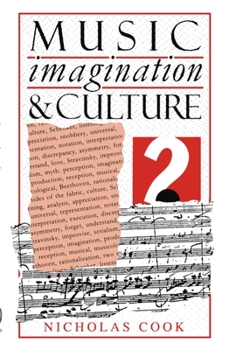Music, Imagination, and Culture
Select Format
Select Condition 
Book Overview
Musicians imagine music by means of functional models which determine certain aspects of the music while leaving others open. This gap between image and the experience it models offers a source of compositional creativity; different musical cultures embody different ways of imagining sound as music. Drawing on psychological and philosophical materials as well as the analysis of specific musical examples, Cook here defines the difference between music theory and aesthetic criticism, and affirms the importance of the "ordinary listener" in musical culture.
Format:Paperback
Language:English
ISBN:0198163037
ISBN13:9780198163039
Release Date:February 1992
Publisher:Clarendon Press
Length:272 Pages
Weight:0.75 lbs.
Dimensions:0.6" x 5.4" x 8.5"
Customer Reviews
2 ratings
Enormously ambitious and yet accessible
Published by Thriftbooks.com User , 15 years ago
I have minimal academic training in music appreciation or theory, but it is a subject that has lately come to interest me, and I have begun working my way through works great (The Rest Is Noise: Listening to the Twentieth Century), sublime (Glenn Gould Reader), and comprehensive (Audio Culture: Readings in Modern Music), among others. The theme of this book, which focuses on the difference between how people think or talk about music on the one hand, and how it is experienced it on the other, has the potential to be a philosophical quagmire. And indeed the first chapter treats that very question quite directly. But the author, thank goodness, has better things to do with our time than to spin his rhetorical wheels (or our cognitive ones) in such an unproductive activity. With urgency, and a great command of scientific, musical, and philosophical knowledge, he sets a fast pace in this fascinating field of inquiry, and engages the reader with relevant, accessible, and ultimately sense-making examples and explanations, time after time after time. More remarkable is that this book represents a snapshot of thinking from 1990, about the time that the mp3 format was being developed and standardized, and eleven years before Apple introduced the iPod, a device which has fundamentally changed how people talk about the music industry on the one hand (mp3 is ruining music! music piracy is killing music!! there's never been a time when so many people have been exposed to such low quality!!!) and how people experience music on the other (more than 220,000,000 iPods sold as of Sept 2009, more than 8.5 billion iTunes downloads as of that same date). And thus the theme, the arguments, and the ultimate findings of this book can subjected to the ultimate scientific test: do they make still make sense after such a technological revolution? The answer, in a word is "YES!". Moreover, I believe that Cook's perspective actually helps inform how the music industry should respond to the technical changes we're now experiencing (and shows the folly of the approach the industry has taken, which is to ignore the listener's experience and merely complain about changes in the listener's buying behavior and willingness to be treated as a mere consumer, and one with no choice, at that!). This book does not dumb anything down, and I know that to fully appreciate all its teachings I'm going to have to buy more music (starting with Webern's Symphony Op 21), but the arguments are sturdy enough and the examples diverse enough that the main points can be grasped on a first reading.
references galore
Published by Thriftbooks.com User , 17 years ago
The real value of this book is in its references to other works and consolidations of them.






